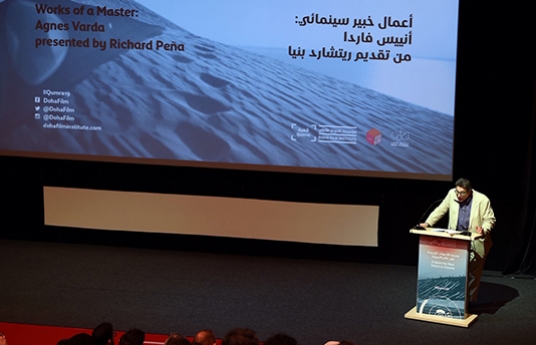الإلهام والإبداع والمشاركة: حلقة نقاشية حول قواعد أنييس فاردا في ملتقى قمرة السينمائي
16 مارس 2019

- ريتشارد بنيا يسلط الضوء على التقنيات والعميات الإبداعية ل“جدة” الموجة الفرنسية الجديدة
الدوحة، قطر: 16 مارس 2019: الإلهام، والإبداع، والمشاركة هي المبادئ الثلاثة التي ترشد آنييس فاردا في كل فيلم تصنعه. تعلّم صناع الأفلام الذين يخوضون تجاربهم الأولى أو الثانية في الإخراج خلال ندوة دراسية ألقاها ريتشارد بنيا عن طريقة فاردا الهجينة في صنع الأفلام، إذ قدم بنيا تحليلا لمقاطع من خمسة من أفلامها: لابورتي كورتي (1955)، كليو من 5 إلى 7(1962)، المتشرد (1985)، الملتقطون وأنا (2000)، شواطئ أنييس (2008).
تشتهر “جدة موجة السينما الفرنسية الجديدة” بأفلامها القصيرة الفريدة من نوعها، والأفلام الروائية والأفلام الوثائقية، ومهاراتها الفنية المميزة في الجمع بين الأشكال الثلاثة في كل مشروع من مشاريعها. وقال بنيا عن أعمالها: “تعد أنييس فاردا فريدة من نوعها بين معاصريها بسبب الطريقة السلسة التي يتدفق بها عملها بين الأفلام الوثائقية والأفلام القصيرة والأفلام الطويلة. كانت رائدة في تقارب الأساليب والأشكال فيما نسميه الآن “بالسينما البحثية”. واهتمت أنييس بالتعبير عن الذات شخصيًا قبل كل شيء، أكثر من مجرد الترفيه”.
وتحدث بنيا خلال ندوة قمرة الدراسية عن استخدام فاردا للتقنيات الثورية المختلفة مثل التوقف بين اللقطات، والتصرف في الكاميرا، والإضاءة المنخفضة، واستعمال التصوير الرقمي المبتكر ولقطات الوسائط المختلطة عند تطور التكنولوجيا.
ولدت فاردا في بلجيكيا عام 1928 لأب يوناني وأم فرنسية، وبدأت مهنتها كمصورة فوتوغرافية في الخمسينات. وفي عام 1954، أصبحت مهتمة بالأفلام حيث استعملت مدخراتها ومساهمات أصدقائها لصنع فيلم لابونتي كورتي (1955)، الذي أصبح من أفضل الأفلام وأكسبها لقب “جدة” الموجة الفرنسية الجديدة. وقالت فاردا لاحقا عن سبب النجاح الباهر لفيلمها:“لم أكن أعرف كيف أصنع أفلاما.”
وصرح بنيا حول مكانة فاردا في سينما الموجة الفرنسية الجديدة قائلا، “إن مشكلة الموجة الفرنسية الجديدة هي أنه يصعب تعريفها. أهي مجموعة من المخرجين، أم فترة زمنية، أم أسلوب صناعة الأفلام؟ كما يوجد تقسيم داخل الموجة الفرنسية الجديدة بين المجموعة اليمينية واليسارية من المخرجين، إذ تميل أنييس إلى المجموعة اليسارية حيث كانت تعتبر السينما أقرب إلى الفنون الأخرى مثل الآداب والموسيقى، كما تأثرت أيضا بالحركة النسوية الفرنسية رغم أنها لم ترغب بأن تبرز من خلال المعتقدات السياسية.”
لقد تم الاحتفال بفاردا كثيرا لمساهمتها في صناعة الأفلام، وغالبا ما تعتبر ذات تأثير كبير للعديد من المخرجين الآخرين. وقد حصلت على العديد من الجوائز تقديرا لعملها، بما في ذلك جائزة الدب الفضي في مهرجان برلين السينمائي الدولي عن فيلم كليو من 5 إلى 7 (1965)، وجائزة الأسد الذهبي في مهرجان فينيسيا السينمائي الدولي (1985) عن فيلمها المتشرد (1985)، وجائزة ليوباردو دي أونور في مهرجان لوكارنو السينمائي (2014)، وجائزة السعفة الذهبية الشرفية في مهرجان كان السينمائي (2015)، وجائزة الجمهور لأفضل فيلم وثائقي في مهرجان تورونتو السينمائي (2017) عن فيلم *وجوه وأماكن*، وجائزة أوسكار شرفية تقديرا لمساهمتها في السينما. وفي عام 2003، أضافت مهنة ثالثة وهي الفنون البصرية وعرضت أعمالها في أهم المعارض والمتاحف المرموقة في العالم.
قال بنيا: “من خلال أفلامها، واهتمامها بالوعي الذاتي، تخبرنا أنييس عن نفسها، باعتبارنا جمهورها، وهو الموضوع الحقيقي في جميع أفلامها، هذا هو سبب الصراحة التامة في أفلامها، الأمر الذي يجعلنا نثق بها كصانعة أفلام.”
يشار إلى أن ريتشارد بنيا، الخبير البارز عالميًا في صناعة الأفلام، هو أستاذ في دراسات الأفلام بجامعة كولومبيا ومدير مهرجان نيويورك السينمائي من 1988 إلى 2012، وهو ليس غريباً على ملتقى قمرة السينمائي، حيث حضر النسخات السابقة لمشاركة أفكاره مع صناع الأفلام الصاعدين من جميع أنحاء العالم.
تجمع النسخة الخامسة من ملتقى قمرة السينمائي أكثر من 150 صانع أفلام ومحترف وخبير سينمائي يشرفون على 36 فيلم في مختلف مراحل الإنتاج لصناع أفلام صاعدين، ويقام ملتقى قمرة السينمائي على مدار ستة أيام من 15 إلى 20 مارس في سوق واقف ومتحف الفن الإسلامي، ويضم ندوات قمرة الدراسية، وجلسات قمرة الحوارية، وعروض أفلام في قسمي عروض خبراء قمرة وأصوات جديدة في عالم السينما.
لمعرفة المزيد حول أسعار التذاكر والمبيعات للعروض، تفضلوا بزيارة الموقع www.dohafilminstitute.com/qumra